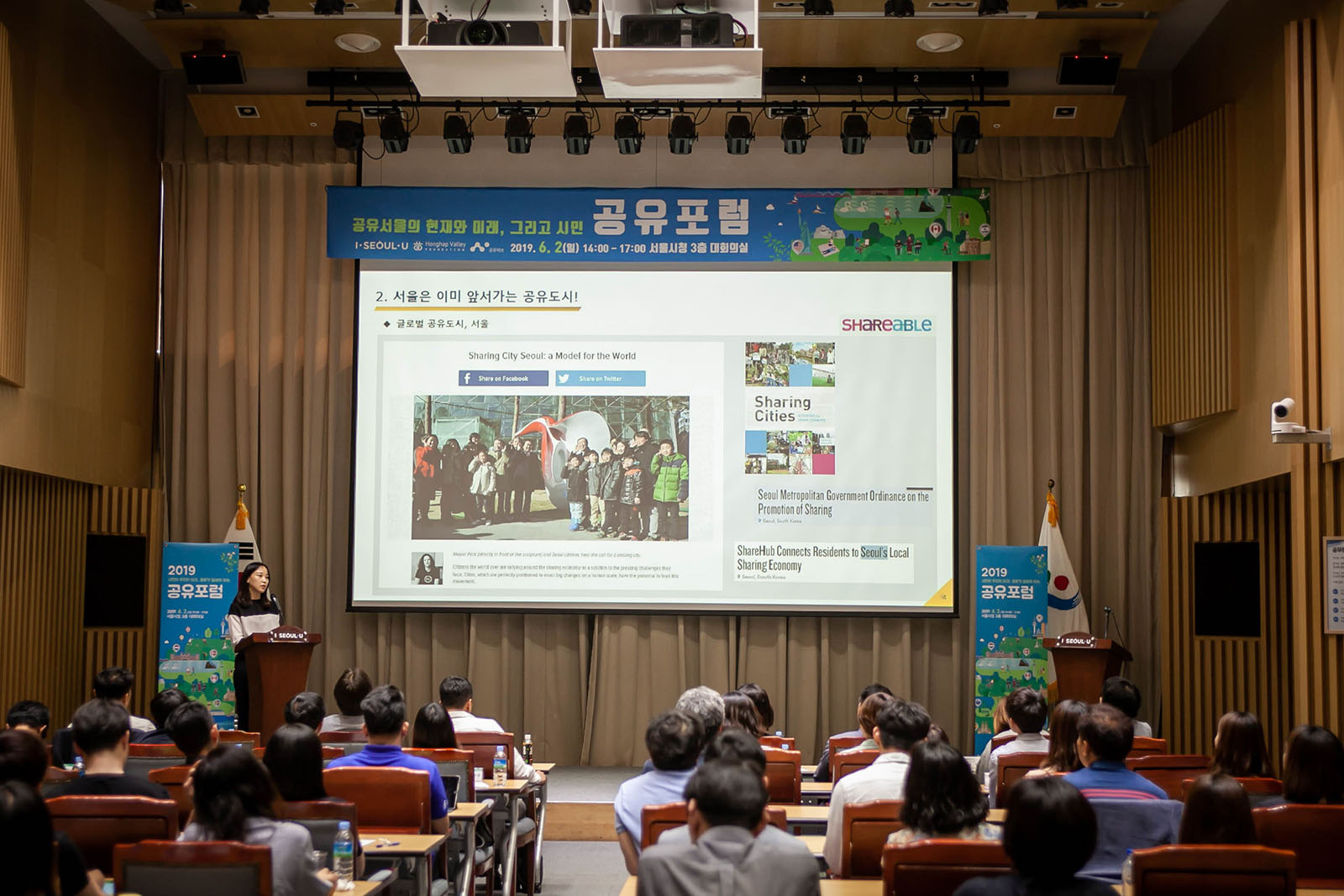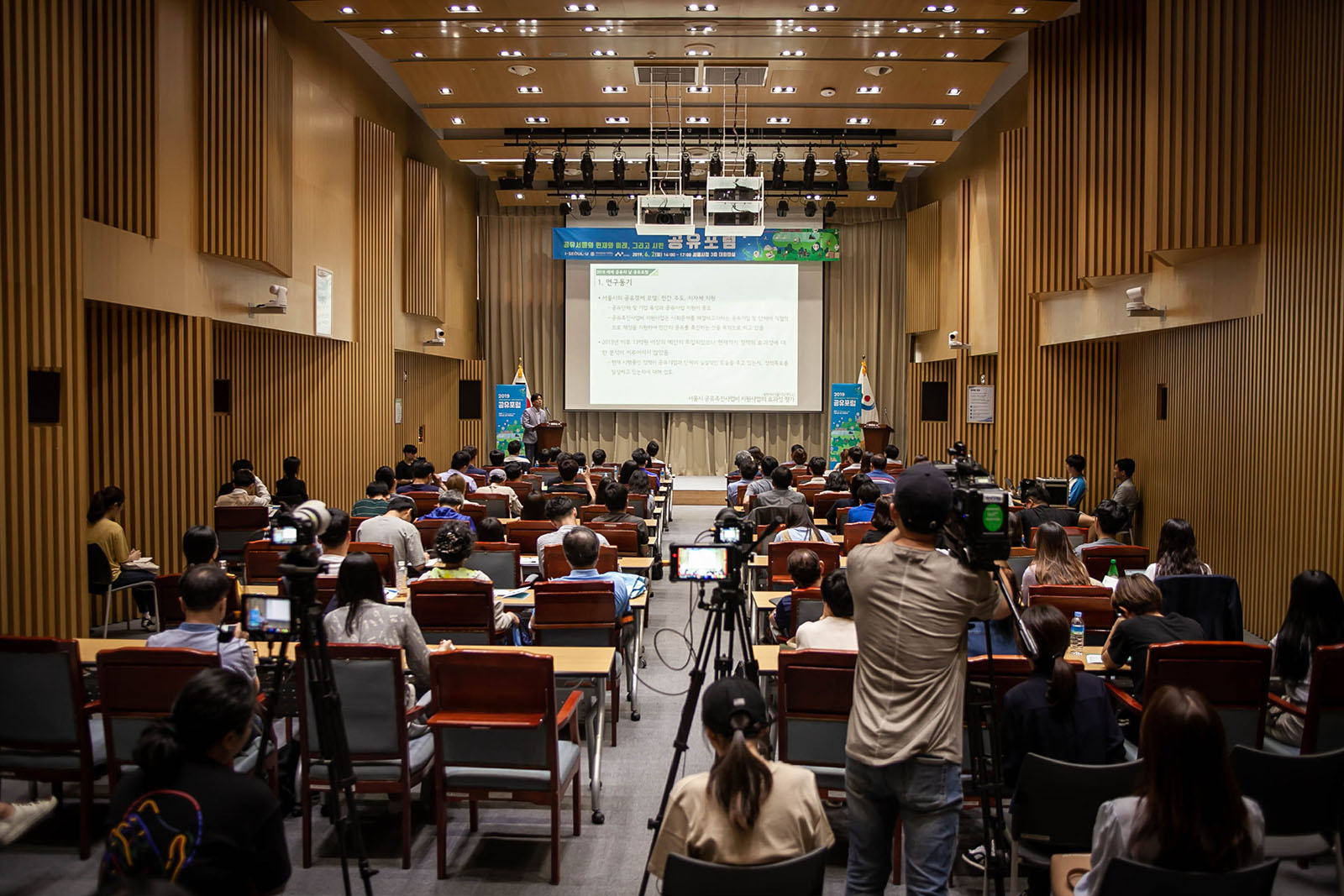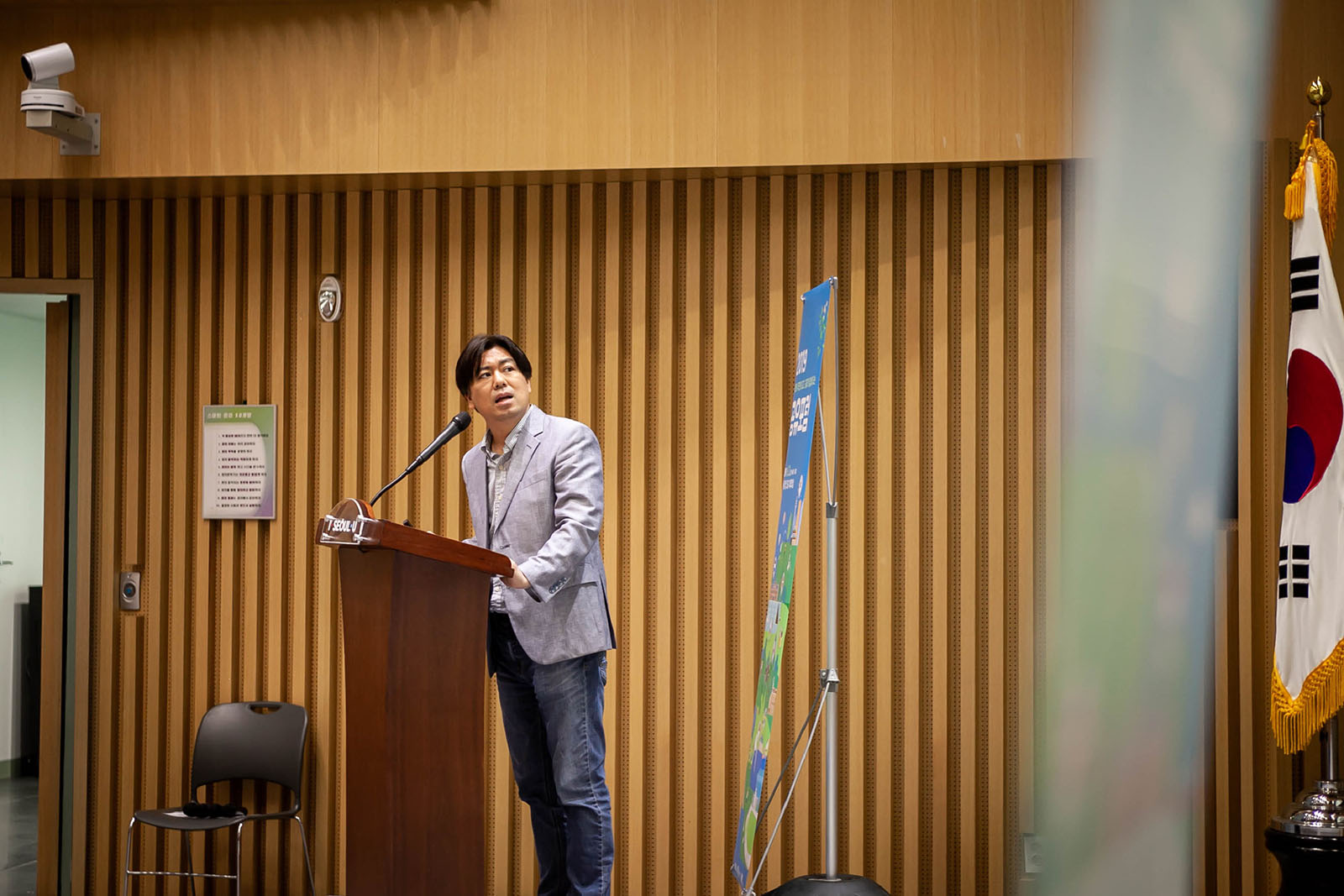List
Story > NEWS > Detail
[UNIV Reporters] The Present and Future of the Shared Policy in Seoul, and the Effectiveness of the Common Facilitation Support Project
On June 2, the 2019 Sharing Day event, hosted by the Seoul Metropolitan Government, was held at the city hall's Grand Auditorium, east of Seoul Plaza. On Sharing Day, where citizens become owners and shares become daily lives, citizens were able to gain a better understanding of sharing through hands-on experience. From 14 to 17 on the same day, a public forum was held at the third floor of Seoul City Hall under the theme of Shared Seoul's Present and Future, and Citizens. Citizens interested in the shared economy had time to learn about the current state of the shared economy and the way forward through a forum spanning a total of three parts. After the announcement of the first-division sharing case, the second part was followed by an announcement of the current and future of Shared Seoul, and the third part of the forum was concluded with the announcement of the case of a shared company in Seoul. This article deals with the current and future of the city's shared policy by Kim Si-jung, a member of the Seoul City Council for Shared Promotion, and Song Hun-jai, a member of the Seoul City Council for Shared Promotion.

The Present and Future of Seoul's Shared Policy - Kim Si-jung, a member of the Seoul City Council for Shared Promotion.

Kim Si-jung, a member of the Seoul Metropolitan Government's Public Promotion Committee, opened the second part by explaining why sharing is receiving renewed attention today. Gong Yoo has existed as a close concept to us in the form of Dulegre and Arbor, but it has emerged as a topic again as the times change," Kim Si-jung said. First of all, the awareness of sustainable consumption has spread as environmental factors have deepened concerns about the environment. Economic factors have also prompted high unemployment and low growth to give up ownership and take advantage of idle resources. In addition, active IT platform and SNS activities performed the catalyst for shared economic growth. These changes have led modern people to pay attention to new shared values.

Kim Si-jung defined the city as a shared city ahead of the Seoul Metropolitan Government, which hosted the forum. In 2012, he declared "Shared City Seoul," and in 2013, he formed a committee to promote sharing and opened a "Shared Hub. Since then, he has presented a shared vision of "private, corporate, civic participation, spreading and daily sharing, problem solving, network, brand and globalization" on five occasions, stressing that he has pursued "new changes in the city, new civic happiness." In addition, it has been promoting public-private partnerships by designating and supporting a total of 102 shared businesses and organizations over the past six years since 2013. Since then, the city's major sharing projects have been expanded to the former autonomous region, and by 18 years, it has moved on to the central living-style sharing of the autonomous region, which supports a total projects in 25 municipalities. The city government's 100 shared activities can be categorized as business-type for profit, social relations-seeking to spread culture through forming relationships, and resource utilization to increase the utilization of idle resources. In these activities, sharing of tangible resources, such as space and goods, was the most important factor, and access and wholesale sharing, which provided and accommodated information rather than transactions directly within the platform.
According to a survey conducted annually by the Seoul Metropolitan Government, about 58 percent of citizens in the second half of 2017 are aware of the city's shared policy. However, 47.8 percent of the respondents said they know their names, compared with 47.8 percent who said they know their names, and so far, not many citizens are familiar with the shared policy. It was also found that citizens who recognized the shared policy knew more about and experienced the city's major shared policies than those who did not. However, 78.7 percent of the respondents said they knew and used certain shared services such as car sharing and public bicycles, even though they were not aware of the shared city policy. In response, Kim Si-jung said, "Even if citizens do not recognize the conceptual aspects of policies, they can easily be recognized if they are specifically serviced." It also revealed the importance of the city's new shared services.
Kim Si-jung suggested three major things in the direction in which future sharing should proceed. First, it is moving toward "comfortable sharing" by adding real-time services to the city's current sharing project. The second is "sustainable sharing." Currently, the Seoul Metropolitan Government's sharing mainly consists of how the Sina autonomous region creates shared resources and increases its utilization. By sharing individuals' idle resources, they will be able to develop this into a sustainable model that spreads new values. The third suggested the need to consider the added value that can be created by sharing with "new sharing." In response, Kim said, "We can turn shared activities into cultural contents and serve them as items that entertain citizens." Finally, he concluded the announcement by stating that the public nature of the New Normal era in the 21st century should move toward publicity that includes respect for humans, autonomy and diversity.

The Effectiveness of Seoul City's Shared Promotion Project - Song Hun-jai, a member of the Seoul City Council for Shared Promotion
Later, the announcement was made by Song Hun-jai, a member of the Public Promotion Committee, on the effectiveness analysis of the support project. Since 2013, the Seoul Metropolitan Government has implemented a project to provide financial support directly to shared companies and organizations that want to solve social problems. Only companies that have completed the application for designation as a public organization or company will be given the opportunity to select the project. The selected companies and organizations will receive a certain portion of the application amount through the document review and presentation process. By 2017, 96 projects were funded by 1.2 billion won and each company and group provided 13 million won on average. Since no effectiveness analysis has been made until now, six years after its implementation, Song Hun-jai analyzed the performance of the support project based on the survival rate of the supported companies. The analysis was conducted based on a database that was built by entering the characteristics of groups and businesses and supporting projects in hand. However, some of the data were lost and the analysis was made based solely on data from March 2015, June and September 2016, and March and September 2017.

Song Hun-jai said the analysis of corporate entities did not reveal any clear differences in financial indicators between companies that received funds for shared promotion projects and those that did not. However, among the companies that received support, relatively large numbers of companies were leading the way in solving traffic problems, and many of those that did not receive the support were sharing space. It also revealed that the rate of application preparation may affect the review given that the average group funded by the share promotion project prepared 64 percent of the total applications, while only 38 percent of the companies did not receive the support.
An analysis of the effectiveness of the support project showed that companies that received funds for the shared promotion project have a high chance of survival. In response, Song Hun-jai believes that the analysis may have been a short-term effect, but it certainly had an important impact. At the same time, however, the government stressed the need to strengthen its review of sustainability in the process of selecting designated public organizations and companies, as the survival of designated shared organizations and companies has been found to have decreased.
A policy proposal was followed by an analysis of the effectiveness of the project supporting the public promotion project. First of all, Song Hun-jai suggested the need for systematic management of the city's various shared policies and projects. It also suggested the need to reexamine the items in the support project application to reduce the burden of preparing the application and to establish a suitable assessment index for shared projects that generate high value. In addition, the city government needs support for platforms where existing businesses connect and share information with each other, it said. Finally, Rep. Song Hun-jai ended the announcement, proposing to seek alternatives to possible problems arising from the growth of the shared economy and to lead to improvements in existing regulations.
The Seoul Metropolitan Government has become a shared city that leads through various shared policies and activities. While the share of major share activities has been high so far, it also has the direction to expand its scope. A systematic analysis of the city's policies, achievements and citizens' reactions to this direction was provided at the forum. Statistics show that citizens are adding recognition to specific services such as Dareung, even if they are not well aware of the shared policy. As many citizens are exposed to a shared culture through the service, we have found that enhancing its convenience can be a way to improve shared awareness and lead voluntary participation in the shared economy. It was regrettable that the management system was not clearly established in support of public-private partnership projects compared to the good purpose of spreading public-private partnerships. As we are predicting the development of a shared economy in the future, we think management should be supported from the trivialities. If user-friendly services with a thorough management system are established, we will also be able to find a clue to the problem regarding conflicts that inevitably arise in the process of developing a shared economy.

On June 2, the 2019 Sharing Day event, hosted by the Seoul Metropolitan Government, was held at the city hall's Grand Auditorium, east of Seoul Plaza. On Sharing Day, where citizens become owners and shares become daily lives, citizens were able to gain a better understanding of sharing through hands-on experience. From 14 to 17 on the same day, a public forum was held at the third floor of Seoul City Hall under the theme of Shared Seoul's Present and Future, and Citizens. Citizens interested in the shared economy had time to learn about the current state of the shared economy and the way forward through a forum spanning a total of three parts. After the announcement of the first-division sharing case, the second part was followed by an announcement of the current and future of Shared Seoul, and the third part of the forum was concluded with the announcement of the case of a shared company in Seoul. This article deals with the current and future of the city's shared policy by Kim Si-jung, a member of the Seoul City Council for Shared Promotion, and Song Hun-jai, a member of the Seoul City Council for Shared Promotion.

The Present and Future of Seoul's Shared Policy - Kim Si-jung, a member of the Seoul City Council for Shared Promotion.

Kim Si-jung, a member of the Seoul Metropolitan Government's Public Promotion Committee, opened the second part by explaining why sharing is receiving renewed attention today. Gong Yoo has existed as a close concept to us in the form of Dulegre and Arbor, but it has emerged as a topic again as the times change," Kim Si-jung said. First of all, the awareness of sustainable consumption has spread as environmental factors have deepened concerns about the environment. Economic factors have also prompted high unemployment and low growth to give up ownership and take advantage of idle resources. In addition, active IT platform and SNS activities performed the catalyst for shared economic growth. These changes have led modern people to pay attention to new shared values.

Kim Si-jung defined the city as a shared city ahead of the Seoul Metropolitan Government, which hosted the forum. In 2012, he declared "Shared City Seoul," and in 2013, he formed a committee to promote sharing and opened a "Shared Hub. Since then, he has presented a shared vision of "private, corporate, civic participation, spreading and daily sharing, problem solving, network, brand and globalization" on five occasions, stressing that he has pursued "new changes in the city, new civic happiness." In addition, it has been promoting public-private partnerships by designating and supporting a total of 102 shared businesses and organizations over the past six years since 2013. Since then, the city's major sharing projects have been expanded to the former autonomous region, and by 18 years, it has moved on to the central living-style sharing of the autonomous region, which supports a total projects in 25 municipalities. The city government's 100 shared activities can be categorized as business-type for profit, social relations-seeking to spread culture through forming relationships, and resource utilization to increase the utilization of idle resources. In these activities, sharing of tangible resources, such as space and goods, was the most important factor, and access and wholesale sharing, which provided and accommodated information rather than transactions directly within the platform.
According to a survey conducted annually by the Seoul Metropolitan Government, about 58 percent of citizens in the second half of 2017 are aware of the city's shared policy. However, 47.8 percent of the respondents said they know their names, compared with 47.8 percent who said they know their names, and so far, not many citizens are familiar with the shared policy. It was also found that citizens who recognized the shared policy knew more about and experienced the city's major shared policies than those who did not. However, 78.7 percent of the respondents said they knew and used certain shared services such as car sharing and public bicycles, even though they were not aware of the shared city policy. In response, Kim Si-jung said, "Even if citizens do not recognize the conceptual aspects of policies, they can easily be recognized if they are specifically serviced." It also revealed the importance of the city's new shared services.
Kim Si-jung suggested three major things in the direction in which future sharing should proceed. First, it is moving toward "comfortable sharing" by adding real-time services to the city's current sharing project. The second is "sustainable sharing." Currently, the Seoul Metropolitan Government's sharing mainly consists of how the Sina autonomous region creates shared resources and increases its utilization. By sharing individuals' idle resources, they will be able to develop this into a sustainable model that spreads new values. The third suggested the need to consider the added value that can be created by sharing with "new sharing." In response, Kim said, "We can turn shared activities into cultural contents and serve them as items that entertain citizens." Finally, he concluded the announcement by stating that the public nature of the New Normal era in the 21st century should move toward publicity that includes respect for humans, autonomy and diversity.

The Effectiveness of Seoul City's Shared Promotion Project - Song Hun-jai, a member of the Seoul City Council for Shared Promotion
Later, the announcement was made by Song Hun-jai, a member of the Public Promotion Committee, on the effectiveness analysis of the support project. Since 2013, the Seoul Metropolitan Government has implemented a project to provide financial support directly to shared companies and organizations that want to solve social problems. Only companies that have completed the application for designation as a public organization or company will be given the opportunity to select the project. The selected companies and organizations will receive a certain portion of the application amount through the document review and presentation process. By 2017, 96 projects were funded by 1.2 billion won and each company and group provided 13 million won on average. Since no effectiveness analysis has been made until now, six years after its implementation, Song Hun-jai analyzed the performance of the support project based on the survival rate of the supported companies. The analysis was conducted based on a database that was built by entering the characteristics of groups and businesses and supporting projects in hand. However, some of the data were lost and the analysis was made based solely on data from March 2015, June and September 2016, and March and September 2017.

Song Hun-jai said the analysis of corporate entities did not reveal any clear differences in financial indicators between companies that received funds for shared promotion projects and those that did not. However, among the companies that received support, relatively large numbers of companies were leading the way in solving traffic problems, and many of those that did not receive the support were sharing space. It also revealed that the rate of application preparation may affect the review given that the average group funded by the share promotion project prepared 64 percent of the total applications, while only 38 percent of the companies did not receive the support.
An analysis of the effectiveness of the support project showed that companies that received funds for the shared promotion project have a high chance of survival. In response, Song Hun-jai believes that the analysis may have been a short-term effect, but it certainly had an important impact. At the same time, however, the government stressed the need to strengthen its review of sustainability in the process of selecting designated public organizations and companies, as the survival of designated shared organizations and companies has been found to have decreased.
A policy proposal was followed by an analysis of the effectiveness of the project supporting the public promotion project. First of all, Song Hun-jai suggested the need for systematic management of the city's various shared policies and projects. It also suggested the need to reexamine the items in the support project application to reduce the burden of preparing the application and to establish a suitable assessment index for shared projects that generate high value. In addition, the city government needs support for platforms where existing businesses connect and share information with each other, it said. Finally, Rep. Song Hun-jai ended the announcement, proposing to seek alternatives to possible problems arising from the growth of the shared economy and to lead to improvements in existing regulations.
The Seoul Metropolitan Government has become a shared city that leads through various shared policies and activities. While the share of major share activities has been high so far, it also has the direction to expand its scope. A systematic analysis of the city's policies, achievements and citizens' reactions to this direction was provided at the forum. Statistics show that citizens are adding recognition to specific services such as Dareung, even if they are not well aware of the shared policy. As many citizens are exposed to a shared culture through the service, we have found that enhancing its convenience can be a way to improve shared awareness and lead voluntary participation in the shared economy. It was regrettable that the management system was not clearly established in support of public-private partnership projects compared to the good purpose of spreading public-private partnerships. As we are predicting the development of a shared economy in the future, we think management should be supported from the trivialities. If user-friendly services with a thorough management system are established, we will also be able to find a clue to the problem regarding conflicts that inevitably arise in the process of developing a shared economy.




